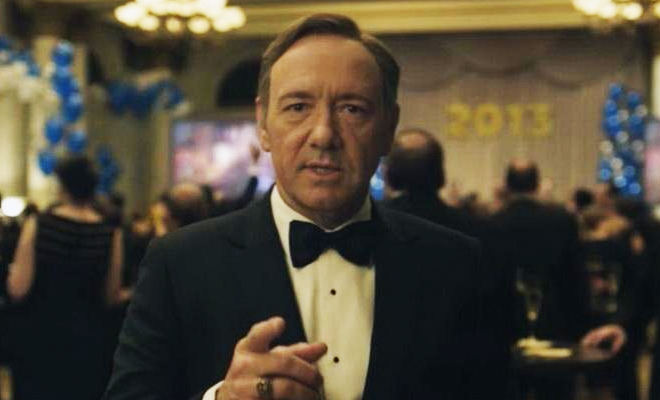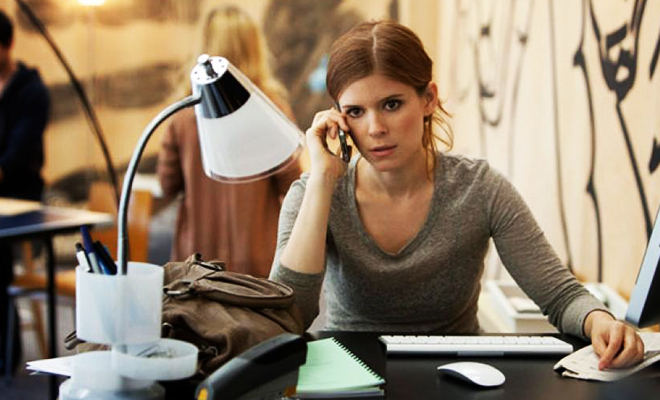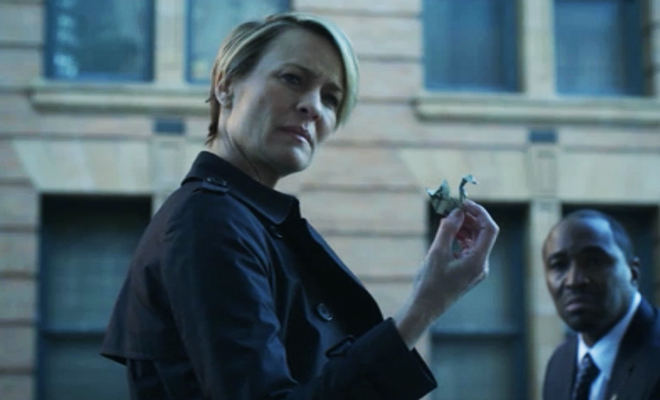Why We Fell For House Of Cards, The Most Cynical Show On TV
Season two drops in full on Netflix at 7pm AEST, before making it to Showcase at noon tomorrow. We can't wait. [Warning: spoilers!]

This article deals with season one of House of Cards; if you haven’t caught up, it’ll be spoiled.
–
Around a year ago you, House of Cards was released on Netflix. For the first time, the company’s online streaming library of film and television would now include original, not-seen-elsewhere, prestige series programming, released all at once in a binge-friendly dump. Lower the curtains and turn your phone to silence, encouraged Netflix; keep punching in that Thai delivery number. Clock up maximum couch sitting hours before spoilers emerge in the ether.
Tomorrow: @HouseOfCards. No spoilers, please.
— Barack Obama (@BarackObama) February 13, 2014
The initial coverage on House of Cards focused mainly on its daring-do of format — no network would really release all their televisual goodies at once, right? — rather than speaking to its artistic aims. And with aims so familiar – a middle aged white guy hungers for power – why would we?
The second season arrives this weekend, and with it comes a question. Now that we’ve gotten over the audacity of its distribution, what’s left to say about this show?
The Most Cynical Show On TV
House of Cards initially seemed by the books — perhaps to the point where Netflix had flat out stolen the book from HBO and Showtime, and ran giggling to the office photocopier. A twisty, gritty drama series starring big names, with charismatic anti-heroes and women buffeted by a patriarchal hierarchy beyond their control — this time brought to you by Oscar nominee David Fincher and winner Kevin Spacey.
Yes, we’ve seen it before and, most importantly, we’ve enjoyed it before. It turns out that Netflix, thanks to its little movie and TV descriptors, and its casual, encouraging way of getting you to rate what you’ve watched, knows exactly what you want, and what the majority of viewers want. As Alexis Madrigal explained in an article for the Atlantic last month, it’s simple maths.
So thanks to every five-star review of Breaking Bad, The West Wing, Seven and The Social Network, Netflix was able to make a pretty damn calculated choice about what its first big television release was going to be. Sound cynical to you? Sure — and because Netflix won’t release its viewing numbers on any given show or film, we’ll never know just how successful it all was.
If all of this behind-the-scene number-crunching in the name of art hasn’t turned you off — if you’ve actually found the risk assessment savvy and illuminating, as it’s hard not to — then you’ve probably found out that you like House of Cards too.
After all, someone with all the foresight and chutzpah of the show’s scheming protagonists worked pretty hard to make sure you would.
What Tangled Webs They Weave
House of Cards rigorously follows the intertwined, ladder-climbing machinations of its two leads: senior congressman Francis Underwood (Kevin Spacey) and junior reporter Zoe Barnes (Kate Mara). This is not a show that checks in on its characters sporadically — the camera is glued to every step of their grasping, grubby journey. Francis is extremely watchable (in a kind of obviously Spacey-esque way): unctuous to his superiors, righteous in the face of scrutiny, and always writhing gloriously with unchecked ambition. His cadences in beat-down mode might match that of some godless bully preacher, and the rest of the time he’s as wearily snippy as a repeat contestant on a reality show. He has all the moves figured out, and he’s definitely not here to make friends. The only real human contact he consistently makes is with his dead eyed thug of a fixer, and his seemingly serene partner in aspiration, wife Claire (played with a cryptic lioness grace by Robin Wright).
And, occasionally, with Zoe.
Zoe Barnes, a Twittered-up blog enthusiast, played out in the season’s opening episodes as the scourge of “professional journalism”: a fame-seeking scoop artist with little to add to the media conversation. She was also, in the beginning, a weak link in a powerhouse cast.
But Zoe’s real goals, so close to Underwood’s, snuck up on me, as did my affection for her character. Mara’s flat, affectless performance can make Spacey seem frilly, while his worn sneer casts her youth as naivety. The affair they begin is a thing devoid of sexiness and more like the motions of two wild animals sizing each other up, a game of bluffs and tells transplanted into the bedroom for want of a better location. They end the season at odds, yet evenly matched.
First You Get The Power, Then You Keep The Power, Then… You Have The Power?
So what is it that these characters want? Is it simply power, more power, repeat?
Francis at first seeks revenge, and his scorched earth path to a seat of higher power is intricate and exhilarating until you wonder what exactly he’ll do once he gets there, and struggle to come up with much of anything. What does House of Cards have to say about politics? This is not a show about moral certainties in a complex democracy, as The West Wing was, or a show about how community necessitates compromise, as Parks and Recreation can be. Francis’ leaps and bounds past various committee chairmen and House senate standoffs are high drama, but illuminate little about how the government works, or why people would pick politics as a profession. And House of Cards brings us as much insight into media as it does to politics. Zoe’s transition from leak happy print journo to online dirt digger is fun to watch, but doesn’t tell us anything we didn’t already know about the fifth estate. Instead the show becomes a melodramatic rumination on what power actually is: who has it, how do they get it, how do they maintain it.

There’s power in loyalty, there’s power in breaking that loyalty and going with the higher bidder, there’s power in the long and the short game and in refusing to play at all. This makes it all the more intriguing that the show’s most interesting liaison is its (seemingly) least dangerous. Francis and Claire are fascinating, because they seem to lack any of the one-upmanship that defines all the others. Even infidelity is dealt with as a bi-product of ambition, remote from emotion.
What I want more of in season two is this relationship, and to see how it might change.
The Next Chapter
Season one left viewers with a fantastic cliff-hanger. Well, actually a few. Francis was finally made Vice President, his victory perhaps dangerously tempered by the looming presence of a new player in Washington: a gruff and mighty energy mogul with the President’s ear (played with a good-humoured, no-bullshit take on Machiavellian scheming by Gerald McRaney). Zoe and her rag-tag team of reporters were narrowing in on the truth behind the tragic death of political up-and-comer Peter Russo, fast on a path that would lead to uncovering its connections to Underwood. But neither of these developments are the plot points I’ll be tuning in for. I’m more intrigued by Claire’s slow-burn, season-long development of a soul.
While once being the perfectly coiffed half of a Washington power couple seemed to be enough for Claire, she ended season one with two conversations that pushed the character, and Wright’s flawless performance, in new directions. “For whom?” she asked Francis, as he rose above the turmoil he created and sat in his desired throne – they’ve achieved so much, but when they’re both gone, “for whom?” The second conversation was with a fertility doctor, and it begs the question – what’s going to screw up Frank’s plans more this coming season, a scandal or a baby? How does a cynical man, and a cynical show, deal with something as uncontaminated as a newborn? They’re big enough questions to get me to tune back in, just as, I’m sure, they were calculated to.
–
Season two of House of Cards premieres on Netflix from 7pm tonight AEST, where the entire season will be available at once. It will premiere in Australia at noon on Saturday February 15 on Showcase, where new episodes will appear once a week. Showcase subscribers are also able to binge-watch the whole season from noon on Saturday, via On Demand, Foxtel Go and Foxtel Play.
–
Matt Roden helps kids tell stories by day at the Sydney Story Factory, and by night helps adults admit to stupidity by co-running Confession Booth and TOD Talks. He is 2SER’s resident TV critic — each Tuesday morning at 8.20am — and his illustration and design work can be seen here.


